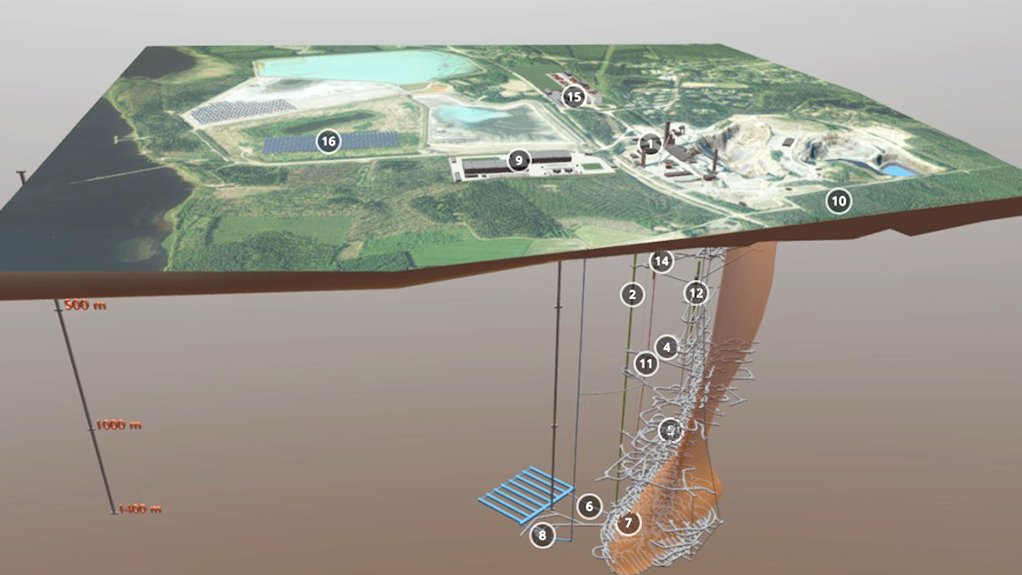Local underground mines can store electricity and optimise water use




KarstHydro MD Guy Richards
KarstHydro operations director Jessica Giger
Finland's Pyhäsalmi copper/zinc mine being repurposed.
South Africa’s many underground mines can be used as batteries that store clean electricity. Electricity is generated by the water descending in the mineshafts turning a pump-turbine.
Mines can be given energy independence in that they can create their own renewable energy, create their own storage and provide energy as and when it is needed.
Mine owners will not have to be concerned with load curtailment or loadshedding, giving them the ability to put a lot more of the input costs under their control.
Simultaneously, local communities could benefit from a utility that supplies them with clean water along with a store of cheap and reliable green energy.
The bulk of the capital required to fund the building of a pumped hydropower facility in a mine will likely go into local pockets.
Local communities will also probably supply the labour to keep mines operating as hydro facilities and undoubtedly provide the human resources needed for the construction of the facility.
Additionally, repurposing mines could help South Africa to advance along the road to energy independence, in general, and possibly also eventual energy exportation, while concurrently ensuring the optimum use of scarce water.
These statements are among the very many insights provided by KarstHydro MD Guy Richards and operations director Jessica Giger during a Zoom interview with Engineering News & Mining Weekly.
KarstHydro specialises in the development of underground pumped hydroelectric energy storage projects, thereby, repurposing mines for energy storage.
Long-term Solution
While the chemical battery systems for the storage of electricity last for 10 to 15 years, pumped hydro longevity from repurposed mines is in the 50- to 100-year category.
“A pumped hydro facility has a far superior lifespan. Those maintaining pumped hydro facilities report that equipment installed 100 years ago is still operating,” say Richards and Giger.
South Africa, which already has hydropower installed in many of its deep-level mines, is probably better positioned than most countries to take advantage of pumped hydropower technology, which is a cost-competitive energy storage solution.
Moreover, it fits hand-in-glove with South Africa’s superior sun and prime wind power to pump the closed-loop water back to surface for renewed release.
There are 50 local mines that already use kinetic energy produced by falling water to spin wheels which generate electricity with the help of Pelton technology installed in the 70s and 80s – primarily for energy recovery.
Included among these mines are some of the world’s deepest operating turbines, with heads of up to 1 890 m, putting South Africa in pole position to take full advantage of the global renewable-energy-plus-storage trend before long.
Advantageously, most of the country’s deep-level mines are in provinces where the installation of chemical battery storage is envisaged, including Gauteng, the Free State and the North West.
South Africa already knows a great deal about pumped hydro thanks to national power utility Eskom’s Drakensberg, Palmiet, Ingula, Steenbras and other pumped storage schemes.
Now the country has the added opportunity of turning discarded mines to further account.
How it Works
Mines have water on surface to cool mine operations under-ground. When the water is gravity fed down the shaft, it produces kinetic energy that turns the Pelton wheel and generates electricity.
There is an upper reservoir, a lower reservoir and a penstock, which is a pipe that joins the two. The pump turbine equipment is positioned at the bottom of the pipe, between the penstock and the lower reservoir. When there is a surplus of energy during the day, when operations have excess renewable power, the water is pumped from the lower reservoir to the upper reservoir. When there is a need for electricity, water is discharged from the upper reservoir to the lower reservoir, spinning the pump-turbine, which produces the electricity needed on demand. This reduces the necessary storage capacity compared with lithium batteries and even hydrogen storage. Hybrid power plants equipped with solar are also becoming popular.
It is a smart, cost-effective solution based on under-utilised physical assets, highlight Richards and Giger.
“While battery energy storage systems are being procured by the Department of Mineral Resources and Energy, mine owners can double as long-life water utilities by reutilising their assets that already have access to power transmission networks, environmental management models, and water-use licences.”
Part of the South African advantage is that the country has many disused mines, and many tunnels are immediately available for storage. In addition, abandoned mines present flooding risk to communities. Keeping the mine open and repurposing it as a utility addresses the safety risk and allows for clean potable water to continue to be produced on the mine.
Further, as underground pumped hydro is a closed system, by using the same water repeatedly, it also addresses South Africa’s water scarcity by reducing water consumption. These projects are suitable for water-scarce countries, with existing Australian and Japanese designs using desalinated water. There is also the opportunity to use mining-impacted water.
Article Enquiry
Email Article
Save Article
Feedback
To advertise email advertising@creamermedia.co.za or click here
Comments
Press Office
Announcements
What's On
Subscribe to improve your user experience...
Option 1 (equivalent of R125 a month):
Receive a weekly copy of Creamer Media's Engineering News & Mining Weekly magazine
(print copy for those in South Africa and e-magazine for those outside of South Africa)
Receive daily email newsletters
Access to full search results
Access archive of magazine back copies
Access to Projects in Progress
Access to ONE Research Report of your choice in PDF format
Option 2 (equivalent of R375 a month):
All benefits from Option 1
PLUS
Access to Creamer Media's Research Channel Africa for ALL Research Reports, in PDF format, on various industrial and mining sectors
including Electricity; Water; Energy Transition; Hydrogen; Roads, Rail and Ports; Coal; Gold; Platinum; Battery Metals; etc.
Already a subscriber?
Forgotten your password?
Receive weekly copy of Creamer Media's Engineering News & Mining Weekly magazine (print copy for those in South Africa and e-magazine for those outside of South Africa)
➕
Recieve daily email newsletters
➕
Access to full search results
➕
Access archive of magazine back copies
➕
Access to Projects in Progress
➕
Access to ONE Research Report of your choice in PDF format
RESEARCH CHANNEL AFRICA
R4500 (equivalent of R375 a month)
SUBSCRIBEAll benefits from Option 1
➕
Access to Creamer Media's Research Channel Africa for ALL Research Reports on various industrial and mining sectors, in PDF format, including on:
Electricity
➕
Water
➕
Energy Transition
➕
Hydrogen
➕
Roads, Rail and Ports
➕
Coal
➕
Gold
➕
Platinum
➕
Battery Metals
➕
etc.
Receive all benefits from Option 1 or Option 2 delivered to numerous people at your company
➕
Multiple User names and Passwords for simultaneous log-ins
➕
Intranet integration access to all in your organisation





















